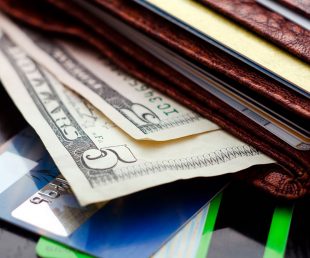For those of us who travel infrequently, taking a flight can be a budget minefield. It’s not just the constantly rising price of airline tickets, either.
If you don’t plan ahead the next time you fly to Aunt Sylvia’s for the holidays, you may find that the associated costs of flying — from checked luggage to parking to food — may just put a big hole in your travel budget.
Here are the ways frequent flyers keep their costs low:
1. Travel light.
Airlines charging for checked bags are nothing new anymore, but the extra charges may still come as a nasty surprise to an infrequent flyer. Make sure you know your airline’s checked luggage guidelines, including the weight limit and number of bags you may check for free or for the lowest price. Knowing what to expect ahead of time will allow you to decide what needs to be packed and what can be shipped ahead (or left behind altogether).
There are also ways to reduce (or eliminate) the fees. You can usually get a cheaper rate if you pay for it before you get to the airport, and you may even have a credit card that will reimburse you for checked baggage fees.
2. Park far away from the airport.
The farther away you park, the less you pay for the privilege. Remote lots that are not associated with the airport are going to be a great deal cheaper than the valet parking right next to the terminal.
Research online, as there are websites you can book from that can give you an even better discount. Consider taking public transportation to the airport or hitching a ride from a friend. Uber is also an option. It takes more planning to be able to avoid the daily parking fee, but it’s certainly worth the effort.
3. Don’t eat at the airport.
Food at airports has two strikes against it: the cost is ridiculously high and the food itself is (generally) unhealthy. Since you are a captive audience, it’s very easy to fall into the expensive airport food trap, but a little planning will save you from overpriced airport nachos.
Carry portable and healthy foods with you, like apples, bananas, nuts, granola bars or even sandwiches. Bring an empty bottle to fill from a water fountain post-security, and you have everything you need for a meal. Your wallet will thank you.
4. Double-check the security requirements.
With the rules for what can and cannot go through security changing from time to time, it really pays for the infrequent flyer to find out exactly what will make it through TSA ahead of time.
For instance, after the prohibition on liquids over 3 ounces was instituted, many travelers found themselves having to give up standard size bottles of shampoo, lotion and other products because they were unaware of the new rule. Knowing what can and cannot be in your carry-on will save you money, time and aggravation.
Editor’s Note: International travelers should also be aware that you sometimes have to leave a terminal and go through TSA again when you transfer flights. I flew from Canada to Los Angeles once and had to throw away a bottle of wine I bought at duty free. The reason was that I had a layover in Las Vegas, and they had me get out of a terminal just to go to another. Obviously, I didn’t know that would happen, and I wasn’t planning to drink the whole bottle when the TSA officer wouldn’t allow me to bring a whole bottle of alcohol through security. I threw away a very expensive bottle of wine I bought as a gift, but lesson learned.
5. Bring your own entertainment.
Every airport boasts several newsstands and bookstores, as many people will forget to bring something to occupy themselves. But buying a magazine, newspaper or book (or worse, a DVD) means paying through the nose for something you could have easily brought from home.
Stop by the library a couple of days before the flight and load up on books, magazines, audio books and DVDs for free, and you’ll have a pleasant flight without spending a penny.
6. Let your purchases work for you.
Even if you are only an occasional flyer, a travel rewards credit card can help you to save up for a major trip. Since these cards allow you to accumulate points or miles toward a trip with your everyday spending, they are a good option for the infrequent flyer who dreams of traveling.
As with any credit card, however, travel rewards cards are only as good as your ability to pay them off each month. But if you are able to use these cards responsibly, you can find yourself flying free to your favorite destination.
Planning ahead will help keep associated airport costs low so you have more money to spend on the vacation itself. And isn’t that the whole point of traveling?
This article was written by David Ning from MoneyNing and was legally licensed through the NewsCred publisher network. Please direct all licensing questions to legal@newscred.com. Santander Bank does not provide financial, tax or legal advice and the information contained in this article does not constitute tax, legal or financial advice. Santander Bank does not make any claims, promises or guarantees about the accuracy, completeness, or adequacy of the information contained in this article. Readers should consult their own attorneys or other tax advisors regarding any financial strategies mentioned in this article. These materials are for informational purposes only and do not necessarily reflect the views or endorsement of Santander Bank.
Equal Housing Lender. Santander Bank, N.A. is a Member FDIC and a wholly owned subsidiary of Banco Santander, S.A. ©2019 Santander Bank, N.A. All rights reserved. Santander, Santander Bank, and the Flame Logo are trademarks of Banco Santander, S.A. or its subsidiaries in the United States or other countries. All other trademarks are the property of their respective owners.
![]()


